University RN Stress: Evidence-Based Project and Relaxation Techniques
VerifiedAdded on 2023/06/10
|46
|11138
|81
Project
AI Summary
This evidence-based practice (EBP) project focuses on addressing the significant issue of stress among registered nurses (RNs) in the healthcare setting. The project acknowledges the high-pressure environment of the nursing profession and its impact on work performance and patient care. The study explores the causes of stress, including psychological and physiological demands, and the effects of occupational stress on nurses' well-being and coping abilities. The project reviews existing literature on stress reduction methods like tai chi, yoga, and music therapy. The primary goal is to implement a relaxation technique, specifically a breathing technique, to minimize stress levels and enhance coping mechanisms among RNs. The project's methodology involves an introduction, literature review, and proposed implementation, including the setting, facilitating factors, and barriers for implementation. The project aims to improve RNs' efficiency by implementing stress management techniques, potentially through educational programs or adjusted work schedules. The project highlights the importance of stress management for nurses, recognizing its impact on patient safety and the delivery of quality healthcare, and the use of relaxation response techniques to address the issue.
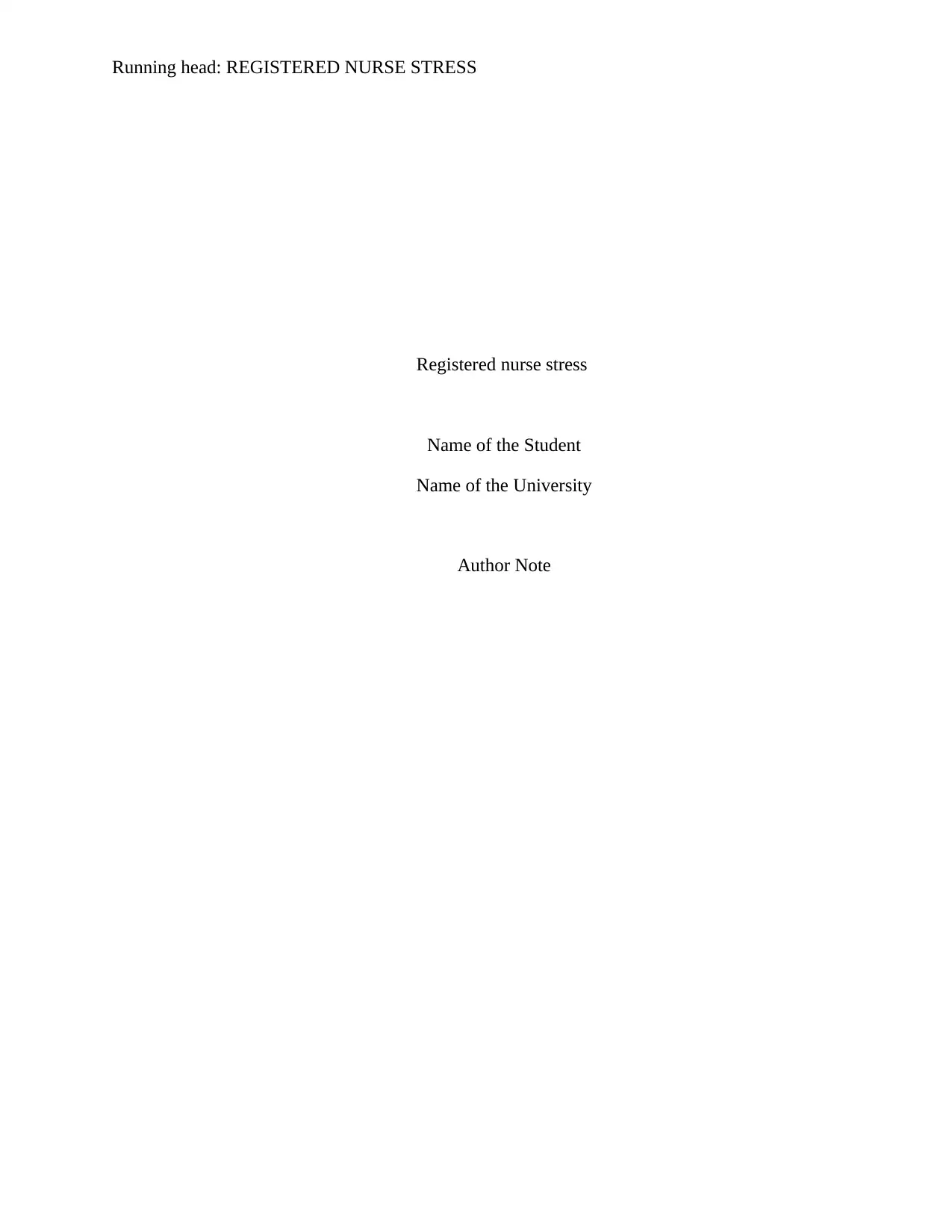
Running head: REGISTERED NURSE STRESS
Registered nurse stress
Name of the Student
Name of the University
Author Note
Registered nurse stress
Name of the Student
Name of the University
Author Note
Paraphrase This Document
Need a fresh take? Get an instant paraphrase of this document with our AI Paraphraser
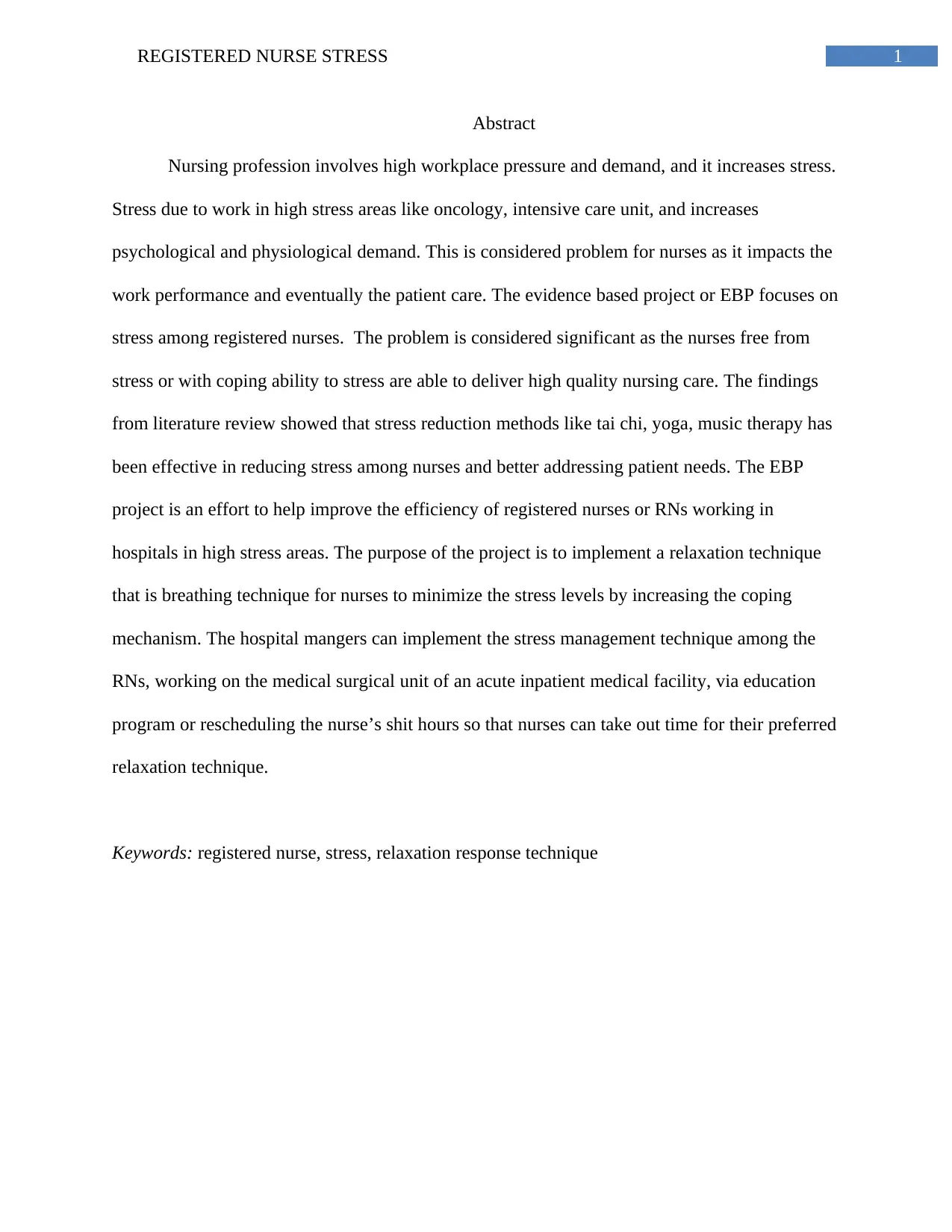
1REGISTERED NURSE STRESS
Abstract
Nursing profession involves high workplace pressure and demand, and it increases stress.
Stress due to work in high stress areas like oncology, intensive care unit, and increases
psychological and physiological demand. This is considered problem for nurses as it impacts the
work performance and eventually the patient care. The evidence based project or EBP focuses on
stress among registered nurses. The problem is considered significant as the nurses free from
stress or with coping ability to stress are able to deliver high quality nursing care. The findings
from literature review showed that stress reduction methods like tai chi, yoga, music therapy has
been effective in reducing stress among nurses and better addressing patient needs. The EBP
project is an effort to help improve the efficiency of registered nurses or RNs working in
hospitals in high stress areas. The purpose of the project is to implement a relaxation technique
that is breathing technique for nurses to minimize the stress levels by increasing the coping
mechanism. The hospital mangers can implement the stress management technique among the
RNs, working on the medical surgical unit of an acute inpatient medical facility, via education
program or rescheduling the nurse’s shit hours so that nurses can take out time for their preferred
relaxation technique.
Keywords: registered nurse, stress, relaxation response technique
Abstract
Nursing profession involves high workplace pressure and demand, and it increases stress.
Stress due to work in high stress areas like oncology, intensive care unit, and increases
psychological and physiological demand. This is considered problem for nurses as it impacts the
work performance and eventually the patient care. The evidence based project or EBP focuses on
stress among registered nurses. The problem is considered significant as the nurses free from
stress or with coping ability to stress are able to deliver high quality nursing care. The findings
from literature review showed that stress reduction methods like tai chi, yoga, music therapy has
been effective in reducing stress among nurses and better addressing patient needs. The EBP
project is an effort to help improve the efficiency of registered nurses or RNs working in
hospitals in high stress areas. The purpose of the project is to implement a relaxation technique
that is breathing technique for nurses to minimize the stress levels by increasing the coping
mechanism. The hospital mangers can implement the stress management technique among the
RNs, working on the medical surgical unit of an acute inpatient medical facility, via education
program or rescheduling the nurse’s shit hours so that nurses can take out time for their preferred
relaxation technique.
Keywords: registered nurse, stress, relaxation response technique
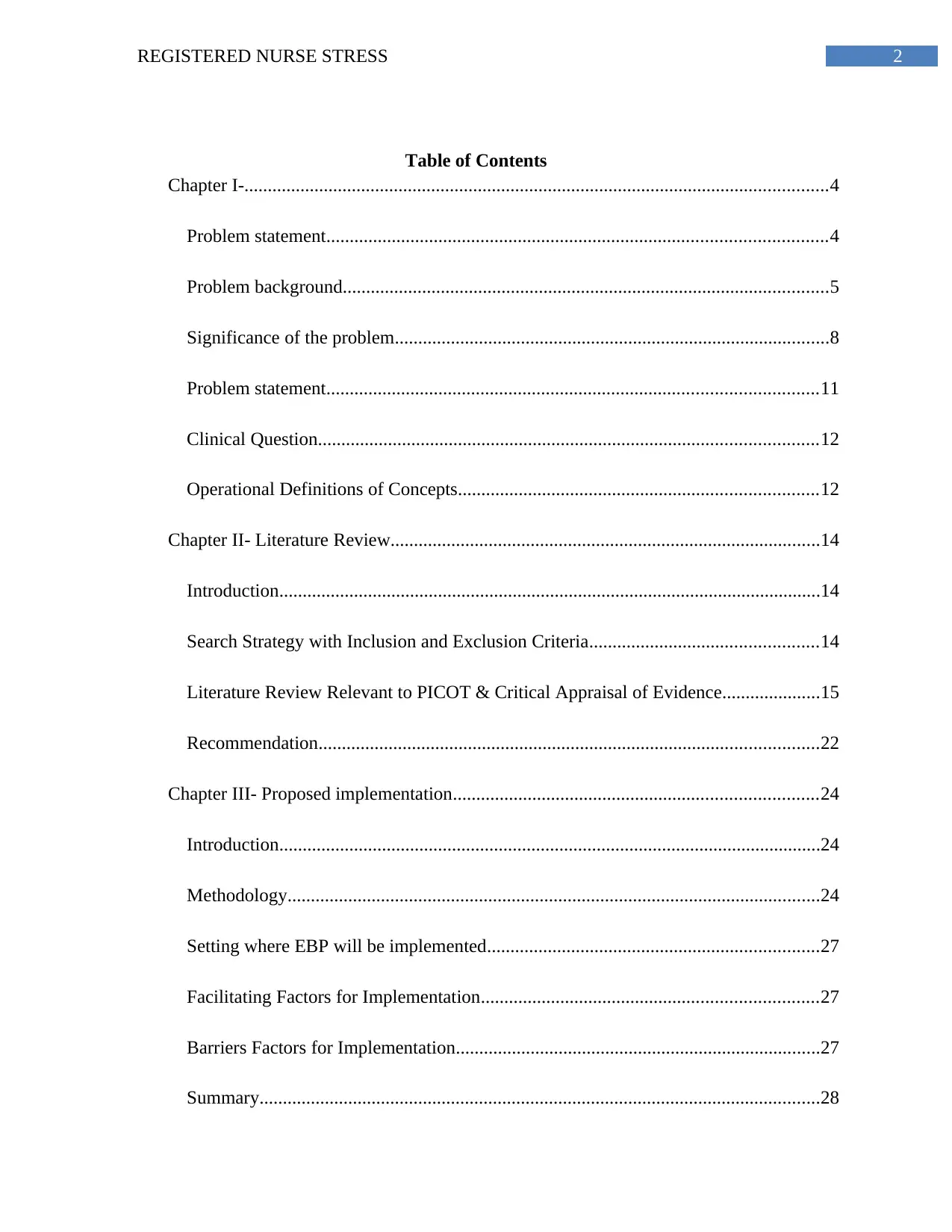
2REGISTERED NURSE STRESS
Table of Contents
Chapter I-.............................................................................................................................4
Problem statement...........................................................................................................4
Problem background........................................................................................................5
Significance of the problem.............................................................................................8
Problem statement.........................................................................................................11
Clinical Question...........................................................................................................12
Operational Definitions of Concepts.............................................................................12
Chapter II- Literature Review............................................................................................14
Introduction....................................................................................................................14
Search Strategy with Inclusion and Exclusion Criteria.................................................14
Literature Review Relevant to PICOT & Critical Appraisal of Evidence.....................15
Recommendation...........................................................................................................22
Chapter III- Proposed implementation..............................................................................24
Introduction....................................................................................................................24
Methodology..................................................................................................................24
Setting where EBP will be implemented.......................................................................27
Facilitating Factors for Implementation........................................................................27
Barriers Factors for Implementation..............................................................................27
Summary........................................................................................................................28
Table of Contents
Chapter I-.............................................................................................................................4
Problem statement...........................................................................................................4
Problem background........................................................................................................5
Significance of the problem.............................................................................................8
Problem statement.........................................................................................................11
Clinical Question...........................................................................................................12
Operational Definitions of Concepts.............................................................................12
Chapter II- Literature Review............................................................................................14
Introduction....................................................................................................................14
Search Strategy with Inclusion and Exclusion Criteria.................................................14
Literature Review Relevant to PICOT & Critical Appraisal of Evidence.....................15
Recommendation...........................................................................................................22
Chapter III- Proposed implementation..............................................................................24
Introduction....................................................................................................................24
Methodology..................................................................................................................24
Setting where EBP will be implemented.......................................................................27
Facilitating Factors for Implementation........................................................................27
Barriers Factors for Implementation..............................................................................27
Summary........................................................................................................................28
⊘ This is a preview!⊘
Do you want full access?
Subscribe today to unlock all pages.

Trusted by 1+ million students worldwide
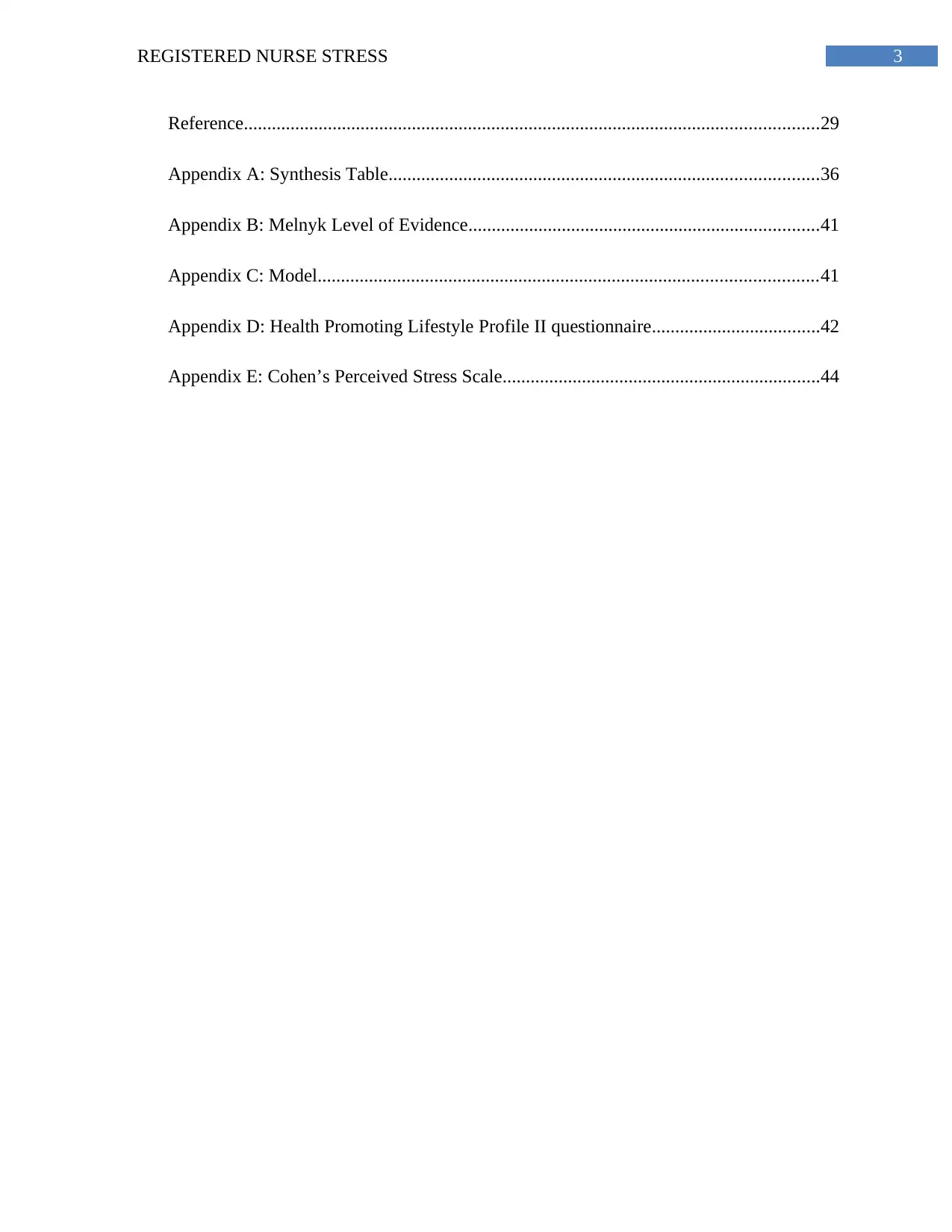
3REGISTERED NURSE STRESS
Reference...........................................................................................................................29
Appendix A: Synthesis Table............................................................................................36
Appendix B: Melnyk Level of Evidence...........................................................................41
Appendix C: Model...........................................................................................................41
Appendix D: Health Promoting Lifestyle Profile II questionnaire....................................42
Appendix E: Cohen’s Perceived Stress Scale....................................................................44
Reference...........................................................................................................................29
Appendix A: Synthesis Table............................................................................................36
Appendix B: Melnyk Level of Evidence...........................................................................41
Appendix C: Model...........................................................................................................41
Appendix D: Health Promoting Lifestyle Profile II questionnaire....................................42
Appendix E: Cohen’s Perceived Stress Scale....................................................................44
Paraphrase This Document
Need a fresh take? Get an instant paraphrase of this document with our AI Paraphraser
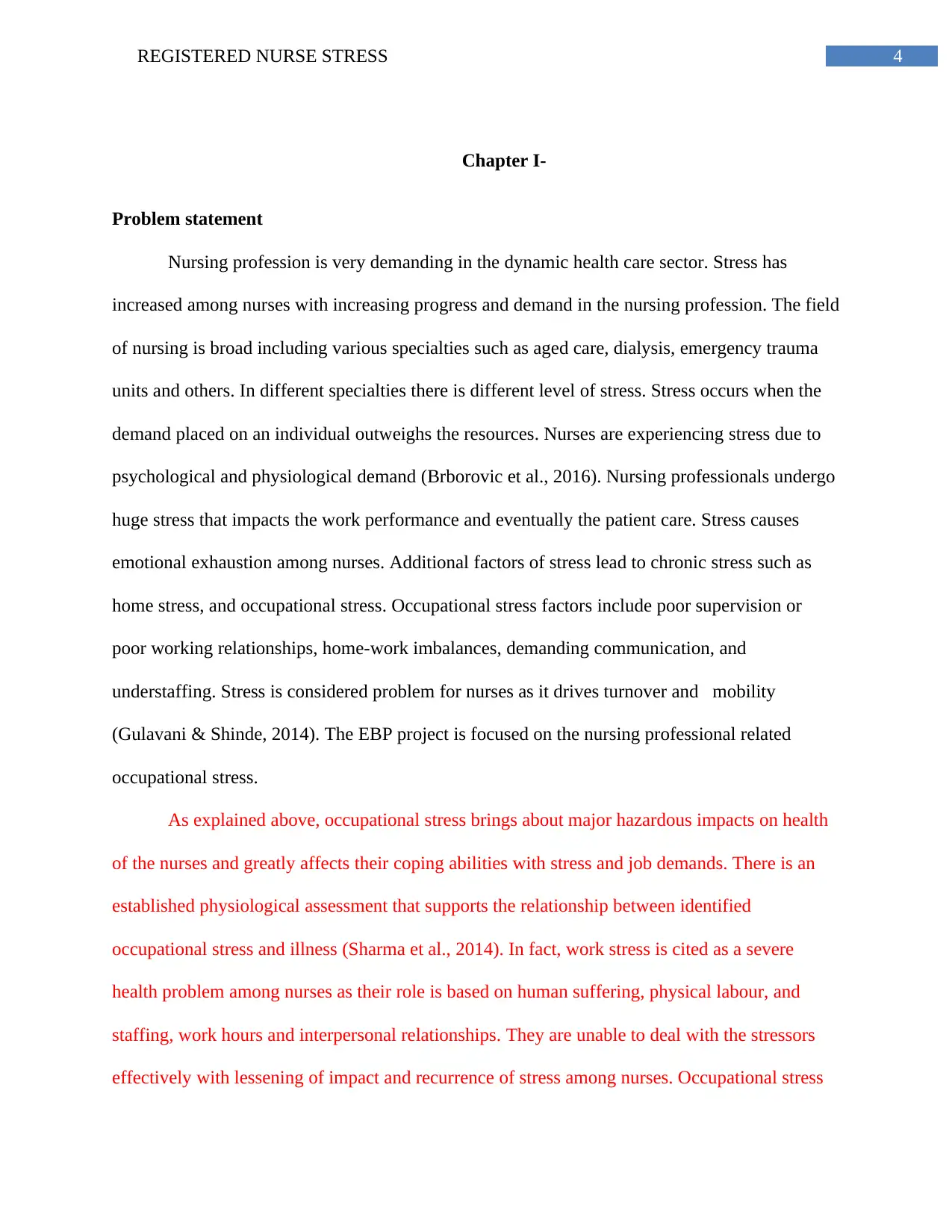
4REGISTERED NURSE STRESS
Chapter I-
Problem statement
Nursing profession is very demanding in the dynamic health care sector. Stress has
increased among nurses with increasing progress and demand in the nursing profession. The field
of nursing is broad including various specialties such as aged care, dialysis, emergency trauma
units and others. In different specialties there is different level of stress. Stress occurs when the
demand placed on an individual outweighs the resources. Nurses are experiencing stress due to
psychological and physiological demand (Brborovic et al., 2016). Nursing professionals undergo
huge stress that impacts the work performance and eventually the patient care. Stress causes
emotional exhaustion among nurses. Additional factors of stress lead to chronic stress such as
home stress, and occupational stress. Occupational stress factors include poor supervision or
poor working relationships, home-work imbalances, demanding communication, and
understaffing. Stress is considered problem for nurses as it drives turnover and mobility
(Gulavani & Shinde, 2014). The EBP project is focused on the nursing professional related
occupational stress.
As explained above, occupational stress brings about major hazardous impacts on health
of the nurses and greatly affects their coping abilities with stress and job demands. There is an
established physiological assessment that supports the relationship between identified
occupational stress and illness (Sharma et al., 2014). In fact, work stress is cited as a severe
health problem among nurses as their role is based on human suffering, physical labour, and
staffing, work hours and interpersonal relationships. They are unable to deal with the stressors
effectively with lessening of impact and recurrence of stress among nurses. Occupational stress
Chapter I-
Problem statement
Nursing profession is very demanding in the dynamic health care sector. Stress has
increased among nurses with increasing progress and demand in the nursing profession. The field
of nursing is broad including various specialties such as aged care, dialysis, emergency trauma
units and others. In different specialties there is different level of stress. Stress occurs when the
demand placed on an individual outweighs the resources. Nurses are experiencing stress due to
psychological and physiological demand (Brborovic et al., 2016). Nursing professionals undergo
huge stress that impacts the work performance and eventually the patient care. Stress causes
emotional exhaustion among nurses. Additional factors of stress lead to chronic stress such as
home stress, and occupational stress. Occupational stress factors include poor supervision or
poor working relationships, home-work imbalances, demanding communication, and
understaffing. Stress is considered problem for nurses as it drives turnover and mobility
(Gulavani & Shinde, 2014). The EBP project is focused on the nursing professional related
occupational stress.
As explained above, occupational stress brings about major hazardous impacts on health
of the nurses and greatly affects their coping abilities with stress and job demands. There is an
established physiological assessment that supports the relationship between identified
occupational stress and illness (Sharma et al., 2014). In fact, work stress is cited as a severe
health problem among nurses as their role is based on human suffering, physical labour, and
staffing, work hours and interpersonal relationships. They are unable to deal with the stressors
effectively with lessening of impact and recurrence of stress among nurses. Occupational stress
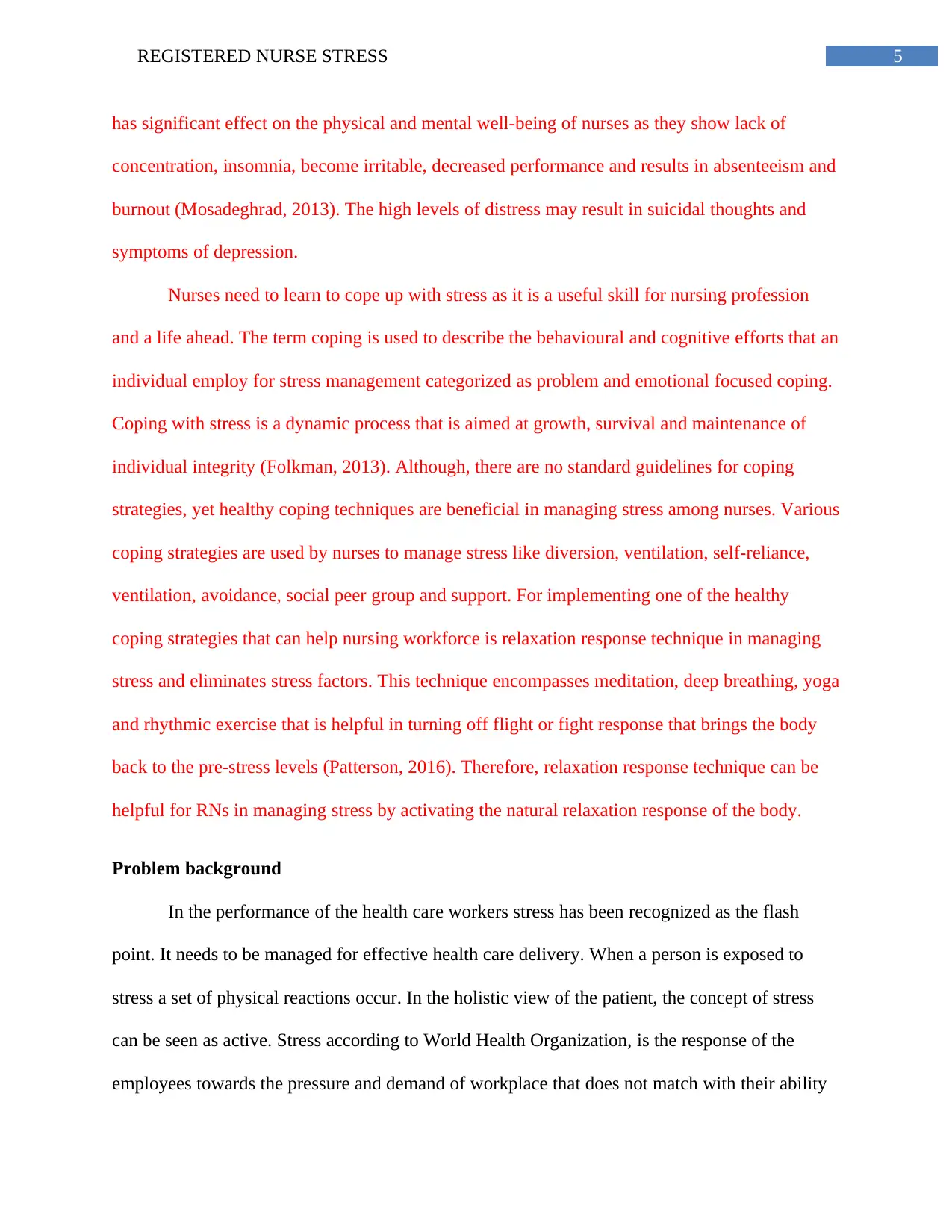
5REGISTERED NURSE STRESS
has significant effect on the physical and mental well-being of nurses as they show lack of
concentration, insomnia, become irritable, decreased performance and results in absenteeism and
burnout (Mosadeghrad, 2013). The high levels of distress may result in suicidal thoughts and
symptoms of depression.
Nurses need to learn to cope up with stress as it is a useful skill for nursing profession
and a life ahead. The term coping is used to describe the behavioural and cognitive efforts that an
individual employ for stress management categorized as problem and emotional focused coping.
Coping with stress is a dynamic process that is aimed at growth, survival and maintenance of
individual integrity (Folkman, 2013). Although, there are no standard guidelines for coping
strategies, yet healthy coping techniques are beneficial in managing stress among nurses. Various
coping strategies are used by nurses to manage stress like diversion, ventilation, self-reliance,
ventilation, avoidance, social peer group and support. For implementing one of the healthy
coping strategies that can help nursing workforce is relaxation response technique in managing
stress and eliminates stress factors. This technique encompasses meditation, deep breathing, yoga
and rhythmic exercise that is helpful in turning off flight or fight response that brings the body
back to the pre-stress levels (Patterson, 2016). Therefore, relaxation response technique can be
helpful for RNs in managing stress by activating the natural relaxation response of the body.
Problem background
In the performance of the health care workers stress has been recognized as the flash
point. It needs to be managed for effective health care delivery. When a person is exposed to
stress a set of physical reactions occur. In the holistic view of the patient, the concept of stress
can be seen as active. Stress according to World Health Organization, is the response of the
employees towards the pressure and demand of workplace that does not match with their ability
has significant effect on the physical and mental well-being of nurses as they show lack of
concentration, insomnia, become irritable, decreased performance and results in absenteeism and
burnout (Mosadeghrad, 2013). The high levels of distress may result in suicidal thoughts and
symptoms of depression.
Nurses need to learn to cope up with stress as it is a useful skill for nursing profession
and a life ahead. The term coping is used to describe the behavioural and cognitive efforts that an
individual employ for stress management categorized as problem and emotional focused coping.
Coping with stress is a dynamic process that is aimed at growth, survival and maintenance of
individual integrity (Folkman, 2013). Although, there are no standard guidelines for coping
strategies, yet healthy coping techniques are beneficial in managing stress among nurses. Various
coping strategies are used by nurses to manage stress like diversion, ventilation, self-reliance,
ventilation, avoidance, social peer group and support. For implementing one of the healthy
coping strategies that can help nursing workforce is relaxation response technique in managing
stress and eliminates stress factors. This technique encompasses meditation, deep breathing, yoga
and rhythmic exercise that is helpful in turning off flight or fight response that brings the body
back to the pre-stress levels (Patterson, 2016). Therefore, relaxation response technique can be
helpful for RNs in managing stress by activating the natural relaxation response of the body.
Problem background
In the performance of the health care workers stress has been recognized as the flash
point. It needs to be managed for effective health care delivery. When a person is exposed to
stress a set of physical reactions occur. In the holistic view of the patient, the concept of stress
can be seen as active. Stress according to World Health Organization, is the response of the
employees towards the pressure and demand of workplace that does not match with their ability
⊘ This is a preview!⊘
Do you want full access?
Subscribe today to unlock all pages.

Trusted by 1+ million students worldwide
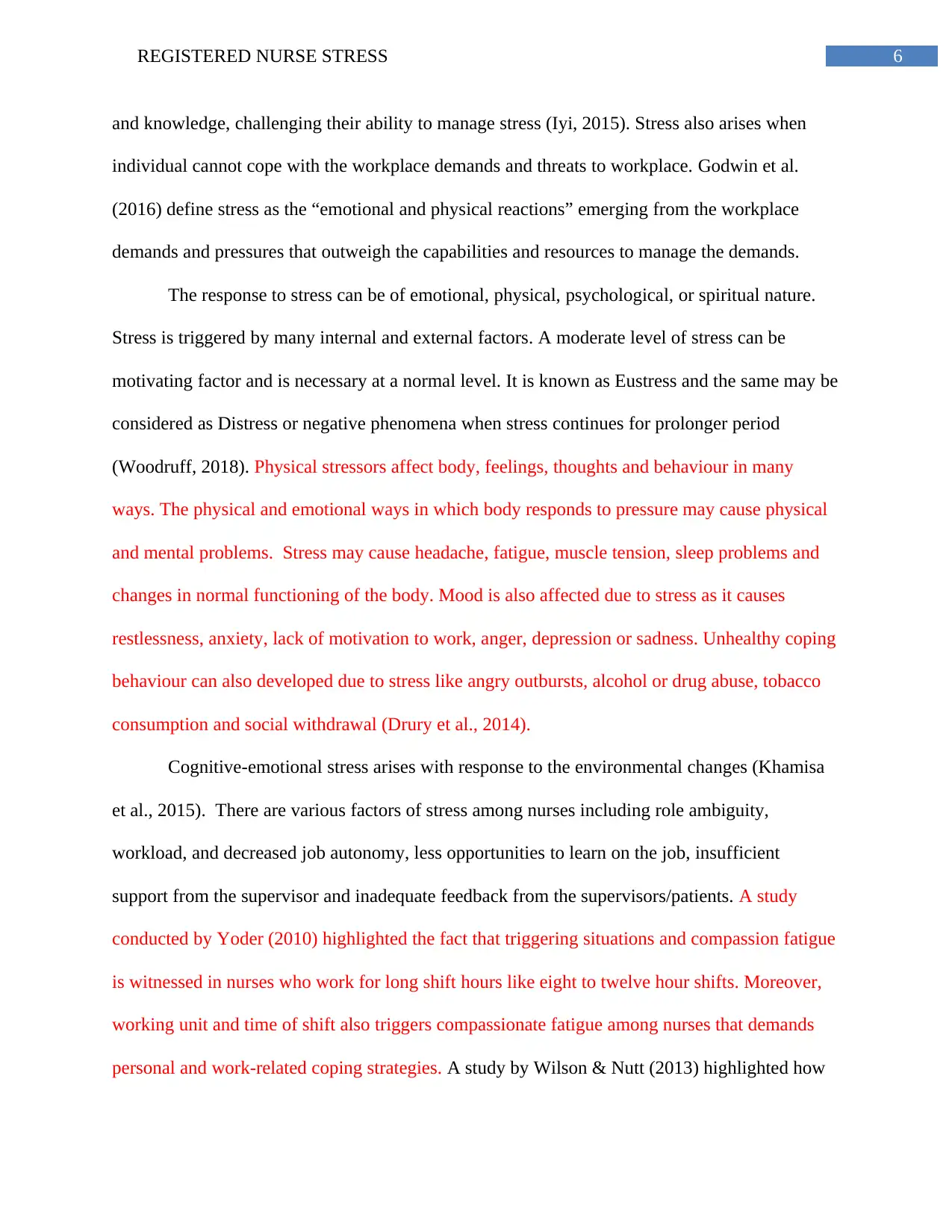
6REGISTERED NURSE STRESS
and knowledge, challenging their ability to manage stress (Iyi, 2015). Stress also arises when
individual cannot cope with the workplace demands and threats to workplace. Godwin et al.
(2016) define stress as the “emotional and physical reactions” emerging from the workplace
demands and pressures that outweigh the capabilities and resources to manage the demands.
The response to stress can be of emotional, physical, psychological, or spiritual nature.
Stress is triggered by many internal and external factors. A moderate level of stress can be
motivating factor and is necessary at a normal level. It is known as Eustress and the same may be
considered as Distress or negative phenomena when stress continues for prolonger period
(Woodruff, 2018). Physical stressors affect body, feelings, thoughts and behaviour in many
ways. The physical and emotional ways in which body responds to pressure may cause physical
and mental problems. Stress may cause headache, fatigue, muscle tension, sleep problems and
changes in normal functioning of the body. Mood is also affected due to stress as it causes
restlessness, anxiety, lack of motivation to work, anger, depression or sadness. Unhealthy coping
behaviour can also developed due to stress like angry outbursts, alcohol or drug abuse, tobacco
consumption and social withdrawal (Drury et al., 2014).
Cognitive-emotional stress arises with response to the environmental changes (Khamisa
et al., 2015). There are various factors of stress among nurses including role ambiguity,
workload, and decreased job autonomy, less opportunities to learn on the job, insufficient
support from the supervisor and inadequate feedback from the supervisors/patients. A study
conducted by Yoder (2010) highlighted the fact that triggering situations and compassion fatigue
is witnessed in nurses who work for long shift hours like eight to twelve hour shifts. Moreover,
working unit and time of shift also triggers compassionate fatigue among nurses that demands
personal and work-related coping strategies. A study by Wilson & Nutt (2013) highlighted how
and knowledge, challenging their ability to manage stress (Iyi, 2015). Stress also arises when
individual cannot cope with the workplace demands and threats to workplace. Godwin et al.
(2016) define stress as the “emotional and physical reactions” emerging from the workplace
demands and pressures that outweigh the capabilities and resources to manage the demands.
The response to stress can be of emotional, physical, psychological, or spiritual nature.
Stress is triggered by many internal and external factors. A moderate level of stress can be
motivating factor and is necessary at a normal level. It is known as Eustress and the same may be
considered as Distress or negative phenomena when stress continues for prolonger period
(Woodruff, 2018). Physical stressors affect body, feelings, thoughts and behaviour in many
ways. The physical and emotional ways in which body responds to pressure may cause physical
and mental problems. Stress may cause headache, fatigue, muscle tension, sleep problems and
changes in normal functioning of the body. Mood is also affected due to stress as it causes
restlessness, anxiety, lack of motivation to work, anger, depression or sadness. Unhealthy coping
behaviour can also developed due to stress like angry outbursts, alcohol or drug abuse, tobacco
consumption and social withdrawal (Drury et al., 2014).
Cognitive-emotional stress arises with response to the environmental changes (Khamisa
et al., 2015). There are various factors of stress among nurses including role ambiguity,
workload, and decreased job autonomy, less opportunities to learn on the job, insufficient
support from the supervisor and inadequate feedback from the supervisors/patients. A study
conducted by Yoder (2010) highlighted the fact that triggering situations and compassion fatigue
is witnessed in nurses who work for long shift hours like eight to twelve hour shifts. Moreover,
working unit and time of shift also triggers compassionate fatigue among nurses that demands
personal and work-related coping strategies. A study by Wilson & Nutt (2013) highlighted how
Paraphrase This Document
Need a fresh take? Get an instant paraphrase of this document with our AI Paraphraser
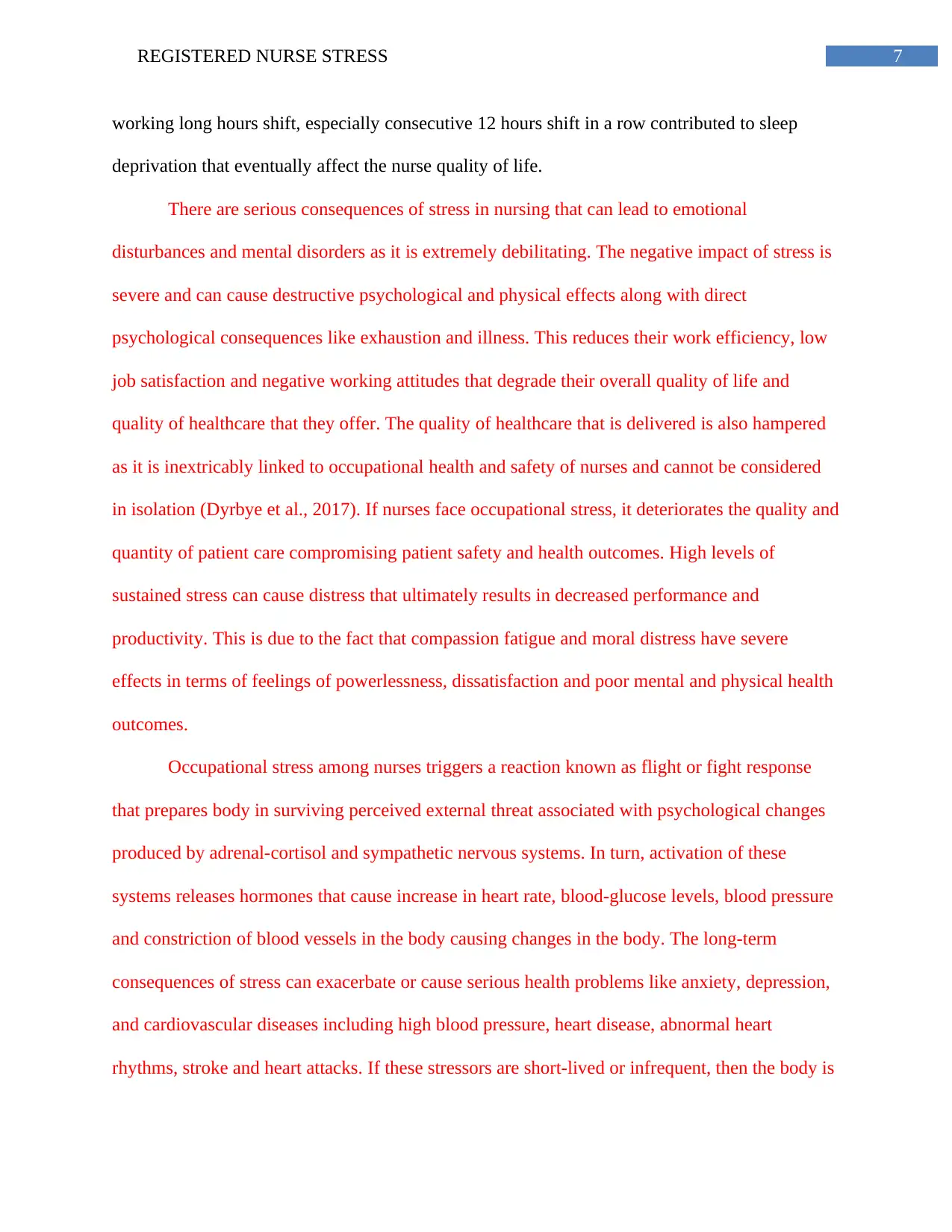
7REGISTERED NURSE STRESS
working long hours shift, especially consecutive 12 hours shift in a row contributed to sleep
deprivation that eventually affect the nurse quality of life.
There are serious consequences of stress in nursing that can lead to emotional
disturbances and mental disorders as it is extremely debilitating. The negative impact of stress is
severe and can cause destructive psychological and physical effects along with direct
psychological consequences like exhaustion and illness. This reduces their work efficiency, low
job satisfaction and negative working attitudes that degrade their overall quality of life and
quality of healthcare that they offer. The quality of healthcare that is delivered is also hampered
as it is inextricably linked to occupational health and safety of nurses and cannot be considered
in isolation (Dyrbye et al., 2017). If nurses face occupational stress, it deteriorates the quality and
quantity of patient care compromising patient safety and health outcomes. High levels of
sustained stress can cause distress that ultimately results in decreased performance and
productivity. This is due to the fact that compassion fatigue and moral distress have severe
effects in terms of feelings of powerlessness, dissatisfaction and poor mental and physical health
outcomes.
Occupational stress among nurses triggers a reaction known as flight or fight response
that prepares body in surviving perceived external threat associated with psychological changes
produced by adrenal-cortisol and sympathetic nervous systems. In turn, activation of these
systems releases hormones that cause increase in heart rate, blood-glucose levels, blood pressure
and constriction of blood vessels in the body causing changes in the body. The long-term
consequences of stress can exacerbate or cause serious health problems like anxiety, depression,
and cardiovascular diseases including high blood pressure, heart disease, abnormal heart
rhythms, stroke and heart attacks. If these stressors are short-lived or infrequent, then the body is
working long hours shift, especially consecutive 12 hours shift in a row contributed to sleep
deprivation that eventually affect the nurse quality of life.
There are serious consequences of stress in nursing that can lead to emotional
disturbances and mental disorders as it is extremely debilitating. The negative impact of stress is
severe and can cause destructive psychological and physical effects along with direct
psychological consequences like exhaustion and illness. This reduces their work efficiency, low
job satisfaction and negative working attitudes that degrade their overall quality of life and
quality of healthcare that they offer. The quality of healthcare that is delivered is also hampered
as it is inextricably linked to occupational health and safety of nurses and cannot be considered
in isolation (Dyrbye et al., 2017). If nurses face occupational stress, it deteriorates the quality and
quantity of patient care compromising patient safety and health outcomes. High levels of
sustained stress can cause distress that ultimately results in decreased performance and
productivity. This is due to the fact that compassion fatigue and moral distress have severe
effects in terms of feelings of powerlessness, dissatisfaction and poor mental and physical health
outcomes.
Occupational stress among nurses triggers a reaction known as flight or fight response
that prepares body in surviving perceived external threat associated with psychological changes
produced by adrenal-cortisol and sympathetic nervous systems. In turn, activation of these
systems releases hormones that cause increase in heart rate, blood-glucose levels, blood pressure
and constriction of blood vessels in the body causing changes in the body. The long-term
consequences of stress can exacerbate or cause serious health problems like anxiety, depression,
and cardiovascular diseases including high blood pressure, heart disease, abnormal heart
rhythms, stroke and heart attacks. If these stressors are short-lived or infrequent, then the body is
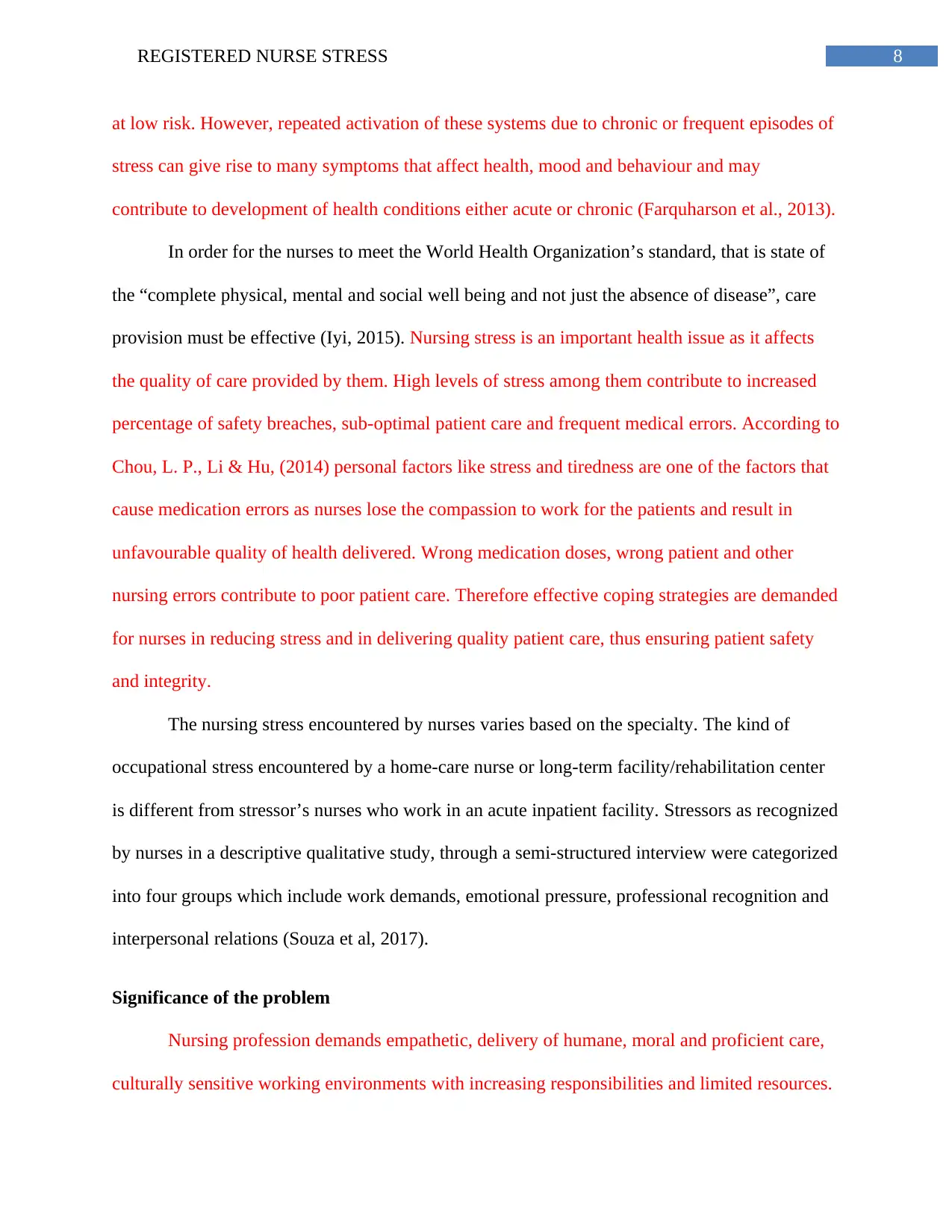
8REGISTERED NURSE STRESS
at low risk. However, repeated activation of these systems due to chronic or frequent episodes of
stress can give rise to many symptoms that affect health, mood and behaviour and may
contribute to development of health conditions either acute or chronic (Farquharson et al., 2013).
In order for the nurses to meet the World Health Organization’s standard, that is state of
the “complete physical, mental and social well being and not just the absence of disease”, care
provision must be effective (Iyi, 2015). Nursing stress is an important health issue as it affects
the quality of care provided by them. High levels of stress among them contribute to increased
percentage of safety breaches, sub-optimal patient care and frequent medical errors. According to
Chou, L. P., Li & Hu, (2014) personal factors like stress and tiredness are one of the factors that
cause medication errors as nurses lose the compassion to work for the patients and result in
unfavourable quality of health delivered. Wrong medication doses, wrong patient and other
nursing errors contribute to poor patient care. Therefore effective coping strategies are demanded
for nurses in reducing stress and in delivering quality patient care, thus ensuring patient safety
and integrity.
The nursing stress encountered by nurses varies based on the specialty. The kind of
occupational stress encountered by a home-care nurse or long-term facility/rehabilitation center
is different from stressor’s nurses who work in an acute inpatient facility. Stressors as recognized
by nurses in a descriptive qualitative study, through a semi-structured interview were categorized
into four groups which include work demands, emotional pressure, professional recognition and
interpersonal relations (Souza et al, 2017).
Significance of the problem
Nursing profession demands empathetic, delivery of humane, moral and proficient care,
culturally sensitive working environments with increasing responsibilities and limited resources.
at low risk. However, repeated activation of these systems due to chronic or frequent episodes of
stress can give rise to many symptoms that affect health, mood and behaviour and may
contribute to development of health conditions either acute or chronic (Farquharson et al., 2013).
In order for the nurses to meet the World Health Organization’s standard, that is state of
the “complete physical, mental and social well being and not just the absence of disease”, care
provision must be effective (Iyi, 2015). Nursing stress is an important health issue as it affects
the quality of care provided by them. High levels of stress among them contribute to increased
percentage of safety breaches, sub-optimal patient care and frequent medical errors. According to
Chou, L. P., Li & Hu, (2014) personal factors like stress and tiredness are one of the factors that
cause medication errors as nurses lose the compassion to work for the patients and result in
unfavourable quality of health delivered. Wrong medication doses, wrong patient and other
nursing errors contribute to poor patient care. Therefore effective coping strategies are demanded
for nurses in reducing stress and in delivering quality patient care, thus ensuring patient safety
and integrity.
The nursing stress encountered by nurses varies based on the specialty. The kind of
occupational stress encountered by a home-care nurse or long-term facility/rehabilitation center
is different from stressor’s nurses who work in an acute inpatient facility. Stressors as recognized
by nurses in a descriptive qualitative study, through a semi-structured interview were categorized
into four groups which include work demands, emotional pressure, professional recognition and
interpersonal relations (Souza et al, 2017).
Significance of the problem
Nursing profession demands empathetic, delivery of humane, moral and proficient care,
culturally sensitive working environments with increasing responsibilities and limited resources.
⊘ This is a preview!⊘
Do you want full access?
Subscribe today to unlock all pages.

Trusted by 1+ million students worldwide
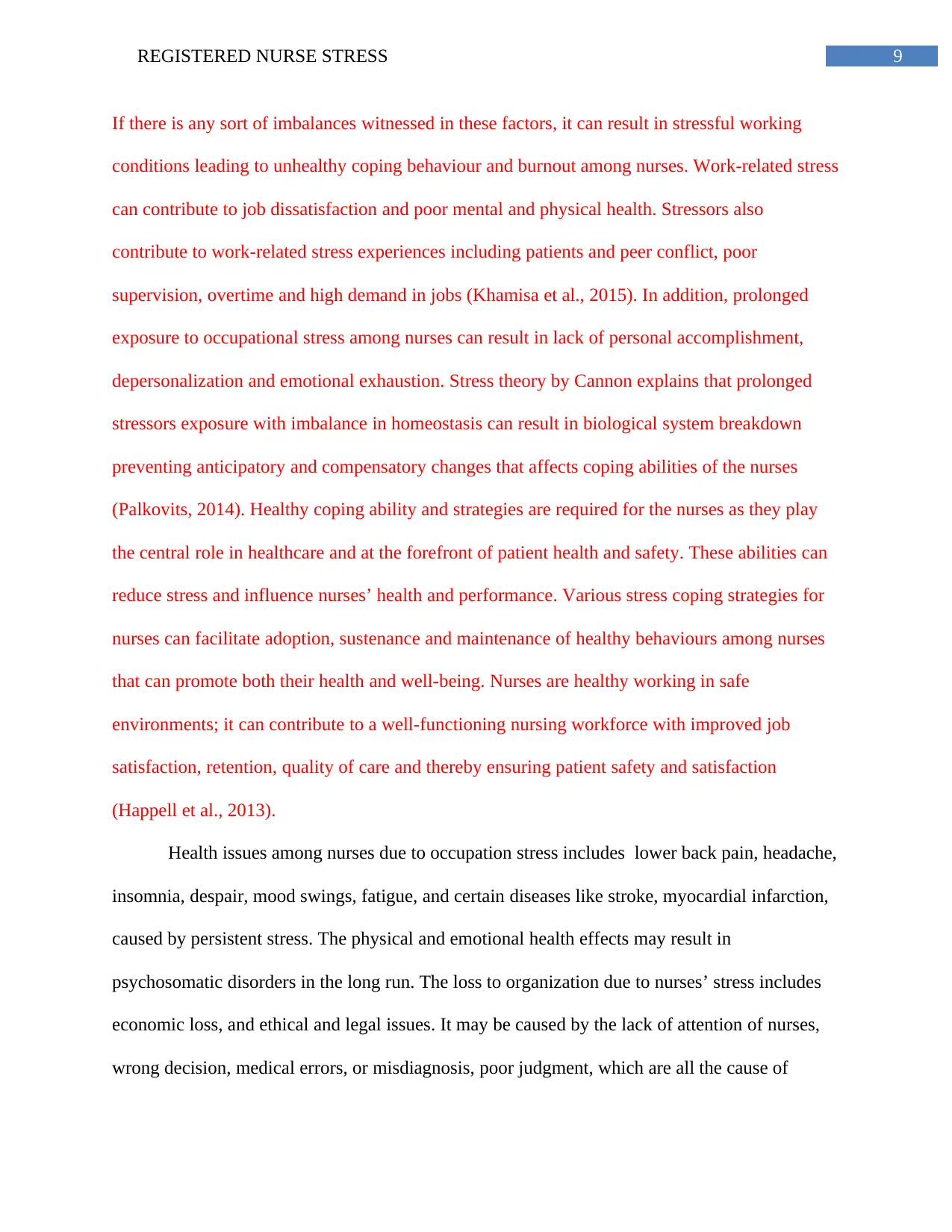
9REGISTERED NURSE STRESS
If there is any sort of imbalances witnessed in these factors, it can result in stressful working
conditions leading to unhealthy coping behaviour and burnout among nurses. Work-related stress
can contribute to job dissatisfaction and poor mental and physical health. Stressors also
contribute to work-related stress experiences including patients and peer conflict, poor
supervision, overtime and high demand in jobs (Khamisa et al., 2015). In addition, prolonged
exposure to occupational stress among nurses can result in lack of personal accomplishment,
depersonalization and emotional exhaustion. Stress theory by Cannon explains that prolonged
stressors exposure with imbalance in homeostasis can result in biological system breakdown
preventing anticipatory and compensatory changes that affects coping abilities of the nurses
(Palkovits, 2014). Healthy coping ability and strategies are required for the nurses as they play
the central role in healthcare and at the forefront of patient health and safety. These abilities can
reduce stress and influence nurses’ health and performance. Various stress coping strategies for
nurses can facilitate adoption, sustenance and maintenance of healthy behaviours among nurses
that can promote both their health and well-being. Nurses are healthy working in safe
environments; it can contribute to a well-functioning nursing workforce with improved job
satisfaction, retention, quality of care and thereby ensuring patient safety and satisfaction
(Happell et al., 2013).
Health issues among nurses due to occupation stress includes lower back pain, headache,
insomnia, despair, mood swings, fatigue, and certain diseases like stroke, myocardial infarction,
caused by persistent stress. The physical and emotional health effects may result in
psychosomatic disorders in the long run. The loss to organization due to nurses’ stress includes
economic loss, and ethical and legal issues. It may be caused by the lack of attention of nurses,
wrong decision, medical errors, or misdiagnosis, poor judgment, which are all the cause of
If there is any sort of imbalances witnessed in these factors, it can result in stressful working
conditions leading to unhealthy coping behaviour and burnout among nurses. Work-related stress
can contribute to job dissatisfaction and poor mental and physical health. Stressors also
contribute to work-related stress experiences including patients and peer conflict, poor
supervision, overtime and high demand in jobs (Khamisa et al., 2015). In addition, prolonged
exposure to occupational stress among nurses can result in lack of personal accomplishment,
depersonalization and emotional exhaustion. Stress theory by Cannon explains that prolonged
stressors exposure with imbalance in homeostasis can result in biological system breakdown
preventing anticipatory and compensatory changes that affects coping abilities of the nurses
(Palkovits, 2014). Healthy coping ability and strategies are required for the nurses as they play
the central role in healthcare and at the forefront of patient health and safety. These abilities can
reduce stress and influence nurses’ health and performance. Various stress coping strategies for
nurses can facilitate adoption, sustenance and maintenance of healthy behaviours among nurses
that can promote both their health and well-being. Nurses are healthy working in safe
environments; it can contribute to a well-functioning nursing workforce with improved job
satisfaction, retention, quality of care and thereby ensuring patient safety and satisfaction
(Happell et al., 2013).
Health issues among nurses due to occupation stress includes lower back pain, headache,
insomnia, despair, mood swings, fatigue, and certain diseases like stroke, myocardial infarction,
caused by persistent stress. The physical and emotional health effects may result in
psychosomatic disorders in the long run. The loss to organization due to nurses’ stress includes
economic loss, and ethical and legal issues. It may be caused by the lack of attention of nurses,
wrong decision, medical errors, or misdiagnosis, poor judgment, which are all the cause of
Paraphrase This Document
Need a fresh take? Get an instant paraphrase of this document with our AI Paraphraser
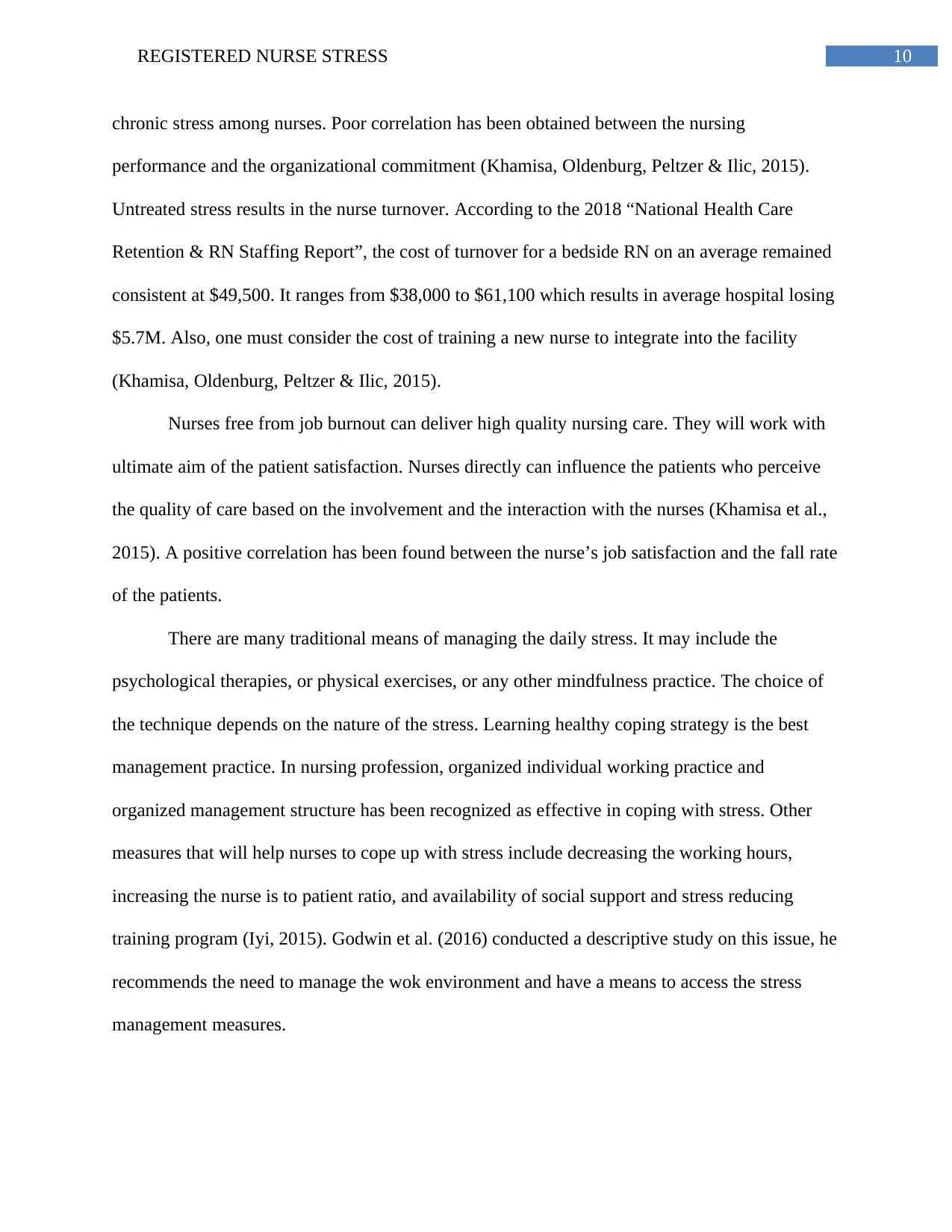
10REGISTERED NURSE STRESS
chronic stress among nurses. Poor correlation has been obtained between the nursing
performance and the organizational commitment (Khamisa, Oldenburg, Peltzer & Ilic, 2015).
Untreated stress results in the nurse turnover. According to the 2018 “National Health Care
Retention & RN Staffing Report”, the cost of turnover for a bedside RN on an average remained
consistent at $49,500. It ranges from $38,000 to $61,100 which results in average hospital losing
$5.7M. Also, one must consider the cost of training a new nurse to integrate into the facility
(Khamisa, Oldenburg, Peltzer & Ilic, 2015).
Nurses free from job burnout can deliver high quality nursing care. They will work with
ultimate aim of the patient satisfaction. Nurses directly can influence the patients who perceive
the quality of care based on the involvement and the interaction with the nurses (Khamisa et al.,
2015). A positive correlation has been found between the nurse’s job satisfaction and the fall rate
of the patients.
There are many traditional means of managing the daily stress. It may include the
psychological therapies, or physical exercises, or any other mindfulness practice. The choice of
the technique depends on the nature of the stress. Learning healthy coping strategy is the best
management practice. In nursing profession, organized individual working practice and
organized management structure has been recognized as effective in coping with stress. Other
measures that will help nurses to cope up with stress include decreasing the working hours,
increasing the nurse is to patient ratio, and availability of social support and stress reducing
training program (Iyi, 2015). Godwin et al. (2016) conducted a descriptive study on this issue, he
recommends the need to manage the wok environment and have a means to access the stress
management measures.
chronic stress among nurses. Poor correlation has been obtained between the nursing
performance and the organizational commitment (Khamisa, Oldenburg, Peltzer & Ilic, 2015).
Untreated stress results in the nurse turnover. According to the 2018 “National Health Care
Retention & RN Staffing Report”, the cost of turnover for a bedside RN on an average remained
consistent at $49,500. It ranges from $38,000 to $61,100 which results in average hospital losing
$5.7M. Also, one must consider the cost of training a new nurse to integrate into the facility
(Khamisa, Oldenburg, Peltzer & Ilic, 2015).
Nurses free from job burnout can deliver high quality nursing care. They will work with
ultimate aim of the patient satisfaction. Nurses directly can influence the patients who perceive
the quality of care based on the involvement and the interaction with the nurses (Khamisa et al.,
2015). A positive correlation has been found between the nurse’s job satisfaction and the fall rate
of the patients.
There are many traditional means of managing the daily stress. It may include the
psychological therapies, or physical exercises, or any other mindfulness practice. The choice of
the technique depends on the nature of the stress. Learning healthy coping strategy is the best
management practice. In nursing profession, organized individual working practice and
organized management structure has been recognized as effective in coping with stress. Other
measures that will help nurses to cope up with stress include decreasing the working hours,
increasing the nurse is to patient ratio, and availability of social support and stress reducing
training program (Iyi, 2015). Godwin et al. (2016) conducted a descriptive study on this issue, he
recommends the need to manage the wok environment and have a means to access the stress
management measures.
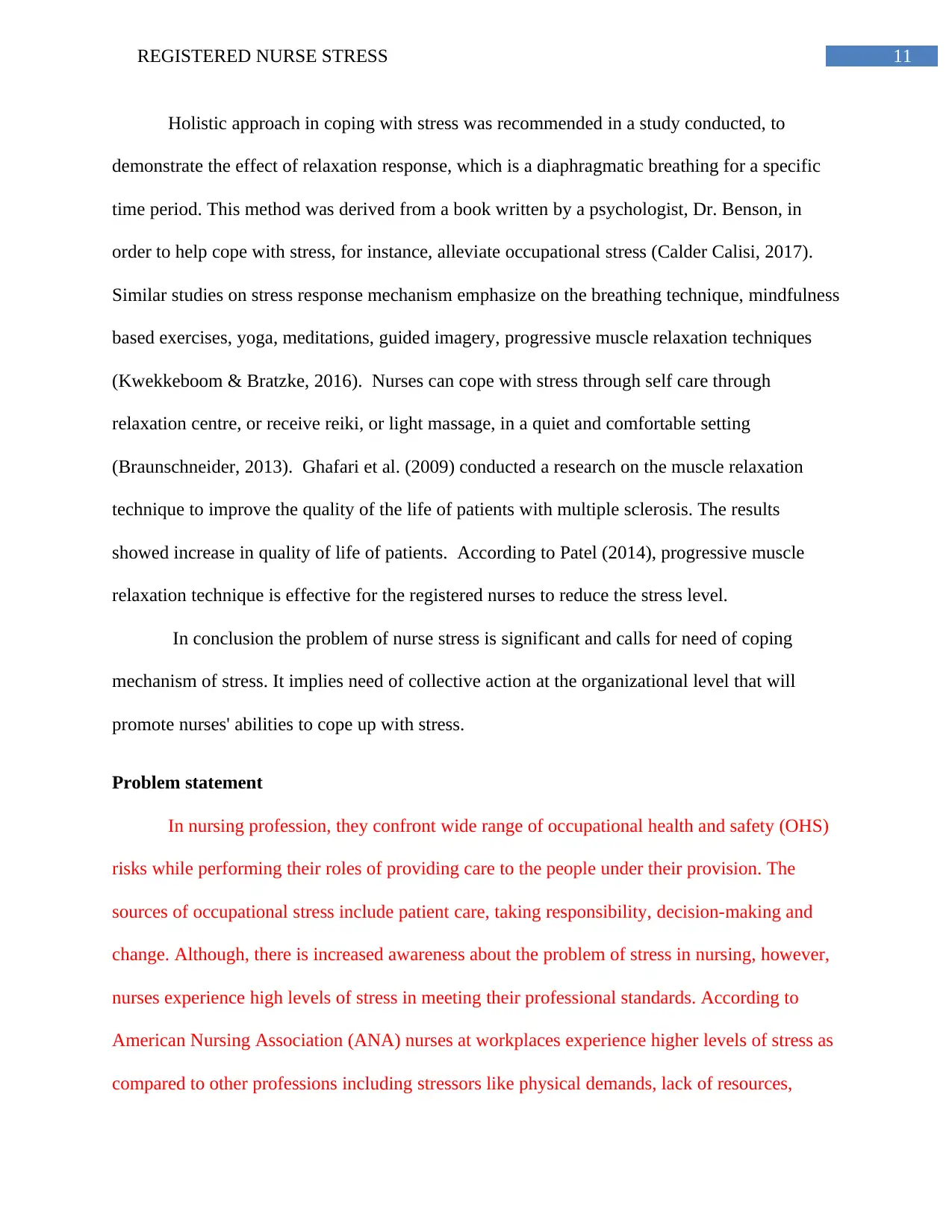
11REGISTERED NURSE STRESS
Holistic approach in coping with stress was recommended in a study conducted, to
demonstrate the effect of relaxation response, which is a diaphragmatic breathing for a specific
time period. This method was derived from a book written by a psychologist, Dr. Benson, in
order to help cope with stress, for instance, alleviate occupational stress (Calder Calisi, 2017).
Similar studies on stress response mechanism emphasize on the breathing technique, mindfulness
based exercises, yoga, meditations, guided imagery, progressive muscle relaxation techniques
(Kwekkeboom & Bratzke, 2016). Nurses can cope with stress through self care through
relaxation centre, or receive reiki, or light massage, in a quiet and comfortable setting
(Braunschneider, 2013). Ghafari et al. (2009) conducted a research on the muscle relaxation
technique to improve the quality of the life of patients with multiple sclerosis. The results
showed increase in quality of life of patients. According to Patel (2014), progressive muscle
relaxation technique is effective for the registered nurses to reduce the stress level.
In conclusion the problem of nurse stress is significant and calls for need of coping
mechanism of stress. It implies need of collective action at the organizational level that will
promote nurses' abilities to cope up with stress.
Problem statement
In nursing profession, they confront wide range of occupational health and safety (OHS)
risks while performing their roles of providing care to the people under their provision. The
sources of occupational stress include patient care, taking responsibility, decision-making and
change. Although, there is increased awareness about the problem of stress in nursing, however,
nurses experience high levels of stress in meeting their professional standards. According to
American Nursing Association (ANA) nurses at workplaces experience higher levels of stress as
compared to other professions including stressors like physical demands, lack of resources,
Holistic approach in coping with stress was recommended in a study conducted, to
demonstrate the effect of relaxation response, which is a diaphragmatic breathing for a specific
time period. This method was derived from a book written by a psychologist, Dr. Benson, in
order to help cope with stress, for instance, alleviate occupational stress (Calder Calisi, 2017).
Similar studies on stress response mechanism emphasize on the breathing technique, mindfulness
based exercises, yoga, meditations, guided imagery, progressive muscle relaxation techniques
(Kwekkeboom & Bratzke, 2016). Nurses can cope with stress through self care through
relaxation centre, or receive reiki, or light massage, in a quiet and comfortable setting
(Braunschneider, 2013). Ghafari et al. (2009) conducted a research on the muscle relaxation
technique to improve the quality of the life of patients with multiple sclerosis. The results
showed increase in quality of life of patients. According to Patel (2014), progressive muscle
relaxation technique is effective for the registered nurses to reduce the stress level.
In conclusion the problem of nurse stress is significant and calls for need of coping
mechanism of stress. It implies need of collective action at the organizational level that will
promote nurses' abilities to cope up with stress.
Problem statement
In nursing profession, they confront wide range of occupational health and safety (OHS)
risks while performing their roles of providing care to the people under their provision. The
sources of occupational stress include patient care, taking responsibility, decision-making and
change. Although, there is increased awareness about the problem of stress in nursing, however,
nurses experience high levels of stress in meeting their professional standards. According to
American Nursing Association (ANA) nurses at workplaces experience higher levels of stress as
compared to other professions including stressors like physical demands, lack of resources,
⊘ This is a preview!⊘
Do you want full access?
Subscribe today to unlock all pages.

Trusted by 1+ million students worldwide
1 out of 46
Related Documents
Your All-in-One AI-Powered Toolkit for Academic Success.
+13062052269
info@desklib.com
Available 24*7 on WhatsApp / Email
![[object Object]](/_next/static/media/star-bottom.7253800d.svg)
Unlock your academic potential
Copyright © 2020–2026 A2Z Services. All Rights Reserved. Developed and managed by ZUCOL.





